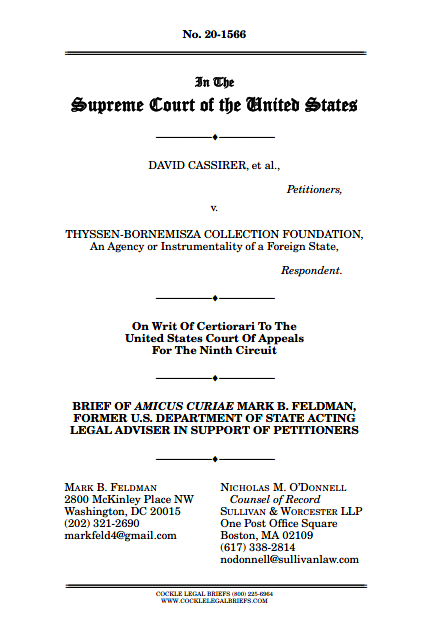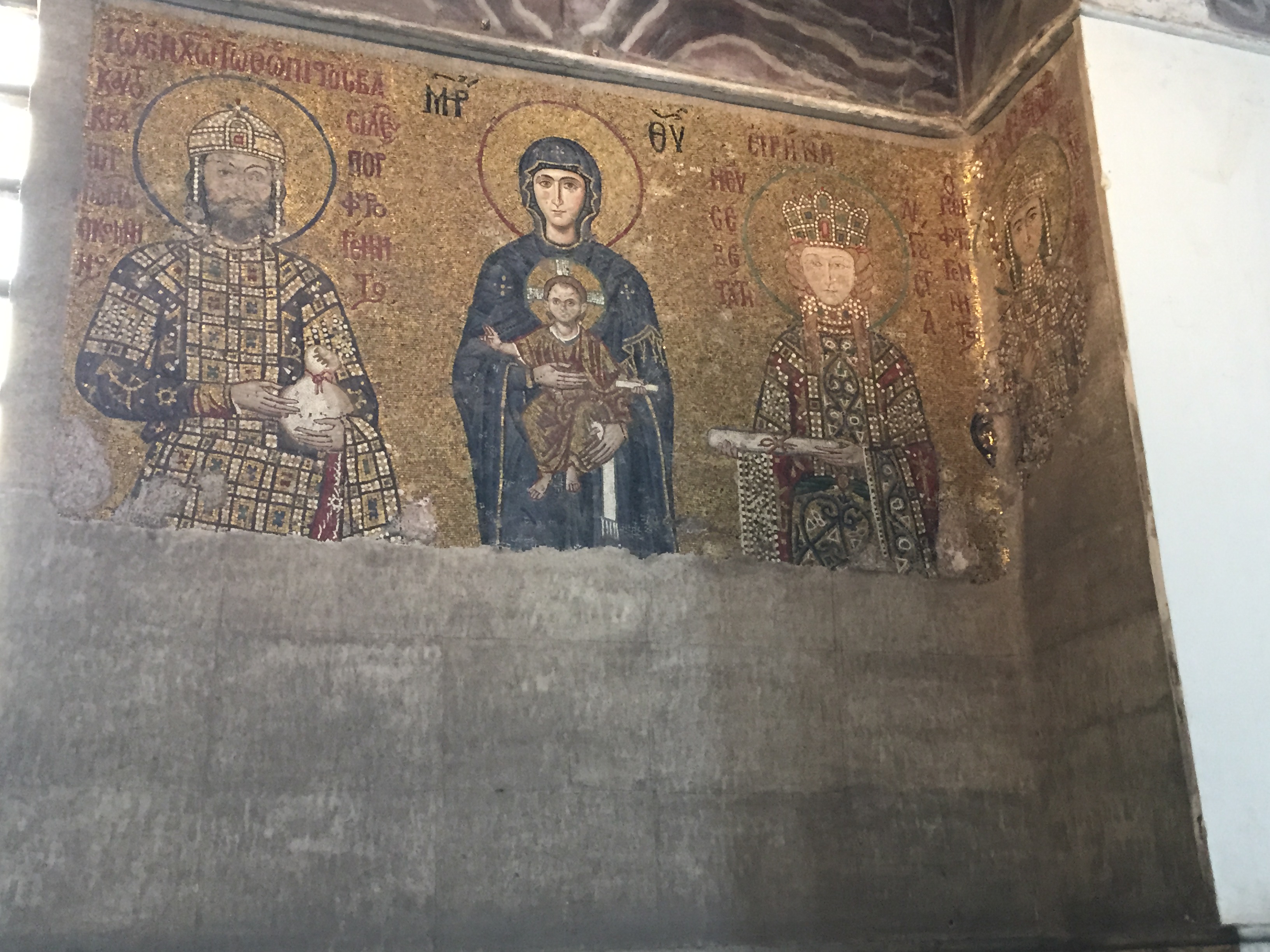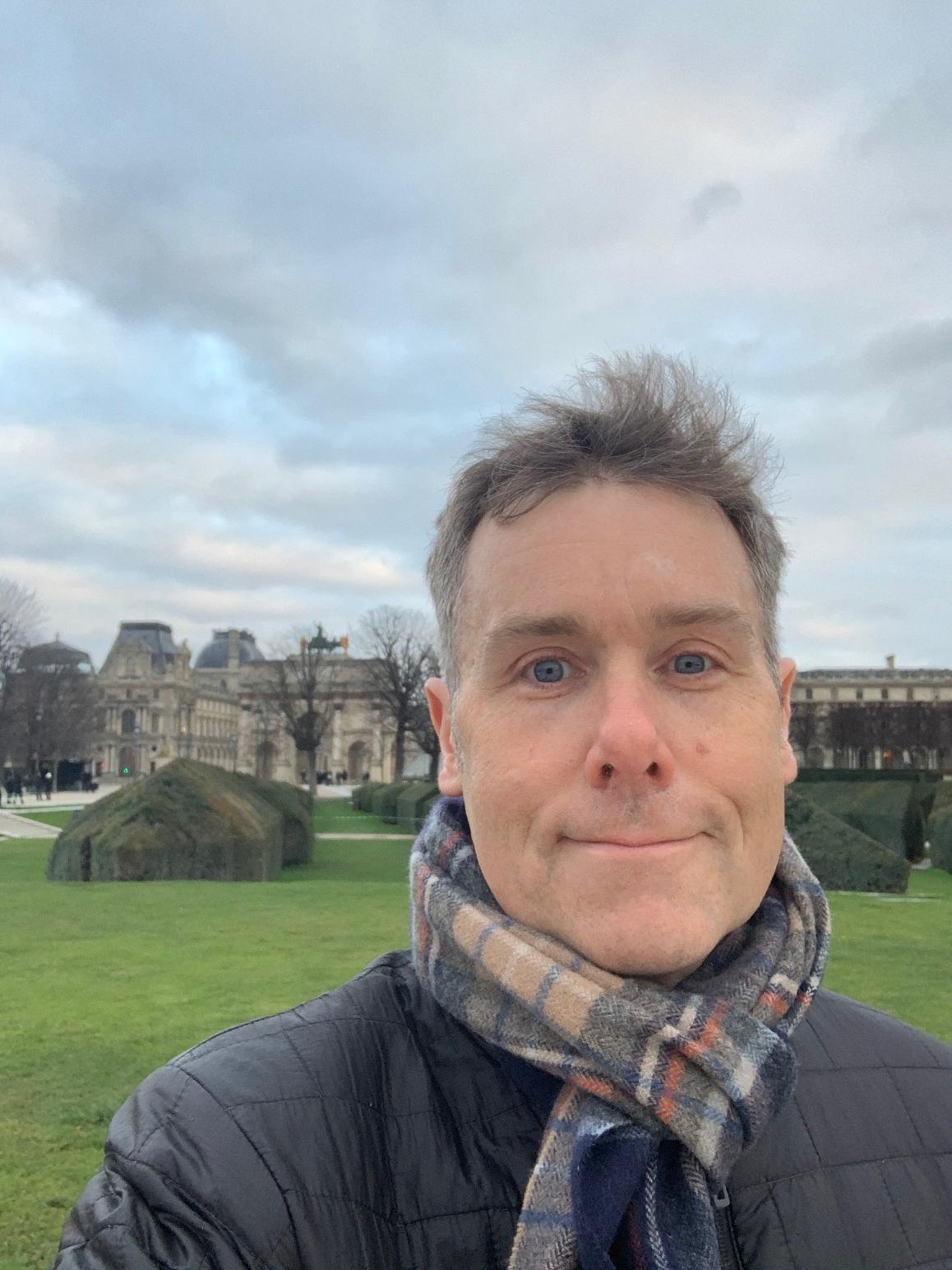Today I am pleased to announce that I have filed a brief in the Supreme Court of the United States as counsel of record for amicus curiae Mark B. Feldman, former U.S. Department of State Acting Legal Adviser. We filed the brief in the case of Cassirer et al. v. Thyssen-Bornemisza Collection Foundation (“TBC”). Cassirer is the long-running dispute over title to Rue St. Honoré, après-midi, effet de pluie (Rue St. Honoré, Afternoon, Rain Effect) by Impressionist painter Camille Pissarro. The painting once belonged to Lilly Cassirer, a Jewish woman in Berlin in 1939, from whom Nazi agents “bought” the painting. The case before the Supreme Court is not about whether the painting was stolen—it is undisputed that it was. Rather, the Supreme Court will review the Ninth Circuit’s decision that Spanish law, not California law, should govern the ownership rights.
Sullivan Files Supreme Court Amicus Brief with former State Department Legal Adviser in Nazi-looted Art Case
Topics: Lilly Cassirer, Foreign Sovereign Immunities Act, Supreme Court, SPK, Stiftung Preussischer Kulturbesitz, Hermann Goering, FSIA, expropriation exception”, sovereign immunity, UNESCO, Rue St. Honoré, Camille Pissarro, Baron Hans-Heinrich Thyssen- Bornemisza, Cassirer v. Thyssen-Bornemisza Collection, Welfenschatz, Jakob Scheidwimmer, Philipp v. F.R.G., Mark B. Feldman
Art Dealer and Holocaust Claimant Asks Supreme Court to Hear Dispute Over Poland’s Vendetta Against Him
We were privileged to file today a petition for certiorari with the Supreme Court of the United States on behalf of our client, art dealer Alexander Khochinsky. The petition asks the Court for reinstatement of a lawsuit against Poland for lack of subject matter jurisdiction (i.e., sovereign immunity) for Poland’s effort to have Khochinsky extradited from New York as leverage to force him to relinquish a painting that he inherited from his father. The case invokes three provisions of the Foreign Sovereign Immunities Act, 28 U.S.C. § 1605 (the FSIA): the implicit waiver exception, the counterclaim exception, and the non-commercial tort exception. The basis on which we seek the Court’s review is simple: if the holding below is the law, then no one is safe in the United States from any number of rogue regimes that abuse the extradition system for discriminatory and persecutory reasons. To allow this decision to stand is a threat to any American. What if, for example, Turkey pursued a Christian American in similar fashion motivated by religious animus about owning a particular kind of art from the Ottoman Empire? What if the Taliban, now the de facto government of Afghanistan, declared a worldwide intention to find Jews in possession of Pashto cultural property? What if China declared American intellectual property to be revolutionary patrimony?
Topics: China, Alexander Khochinsky, Holocaust claims, extradition, FSIA, "Girl with Dove", Foreign Sovereign Immunities, Poland, Sullivan and Worcester LLP, 28 U.S.C. § 1605, Operation Barbarossa, Taliban, Afghanistan, Turkey, Pashto
FinCEN Issues Notice of Proposed Rulemaking to Regulate Dealers in Antiquities
The Treasury Department’s Financial Crimes Enforcement Network (FinCEN) today published in the Federal Register notice of proposed regulations related to the implementation of amendments to the Bank Secrecy Act (BSA) regarding the trade in antiquities pursuant to last year’s Anti-Money Laundering Act. After relative silence over the nine months since the AMLA was passed as part of the National Defense Authorization Act, FinCEN somewhat surprisingly still has not drafted any proposed regulations, but rather seeks additional comment on a series of substantive questions. This effort to gather meaningful data is a positive step, but raises concerns about interested parties’ ability to respond by the 30 day deadline, and whether FinCEN will have time to incorporate those comments into regulations that must be promulgated (after further public notice and comment) by the end of 2021.
Topics: Antiquities, AML, Money laundering, FinCEN, Financial Crimes Enforcement Network, Bank Secrecy Act, National Defense Authorization Act, Treasury Department, BSA, Anti-Money Laundering Act, Byzantium
Virtual Fever, the New Pandemic? Trends in International Property, Art, Space, and Technology Law in Berlin October 11-12
There’s just no other way to say it: the last 18 months have been extraordinarily hard. Professionally, what I have missed the most is the chance to connect with, and learn from colleagues, particularly those far away. It is therefore with great excitement and pride that I can announce that the International Bar Association’s Intellectual Property Section will hold a live, in-person conference next month on trends in IP law. As my second year as co-chair of the Art, Cultural Institutions and Heritage Law Committee winds down, I am so pleased that we will be contributing a panel to this terrific event about, what else, Non-Fungible Tokens. As anyone who has watched my LinkedIn feed this past summer will know, Berlin holds a very special place in my life and so I look forward to making my first trip overseas in a very long time to a city that is like a second home.
The program, to which the several committees organized, is below and registration is open.
Bis zum nächsten Mal in Berlin!
Topics: Berlin, Art Cultural Institutions and Heritage Committee o, Sullivan & Worcester LLP, Events, IBA, Nicholas M. O'Donnell, Anne-Sophie Nardon, Laurent De Muyter, Blanca Escribano, Frank P Maier-Rigaud, ABC Economics, Anne Vallery, Katharina Garbers-von Boehm, Büsing, Müffelmann & Theye, Martin Wilson, Phillips Auctioneers, Johann König, Elisa Henry, Ruben A Hofmann, Paulina Silva, Grace Nacimiento, Laurent Schummer, Luc Govaert, Joanne Wheeler, Jason Jarvis Jardine, Nazli Cansin Karga Giritli, Novartis, Niko Härting, Sajai Singh, Martin Viciano Gofferje, Borghese Associes, KÖNIG GALERIE, Erik Valgaeren, Özge Atilgan, Corey Salsberg, Felix Engelhardt, Christine Graham, Volodymyr Yakubovskyy
Sullivan Art Law Practice Recognized by Chambers and Partners Rankings
I am pleased and humbled to report that Chambers and Partners has issued its 2021 High Net Worth Guide Rankings, and that I was ranked as a Band 2 Ranked Individual in Art and Cultural Property Law rankings for the United States. Chambers is a thorough and highly regarded practice ranking, and the recognition is a validation of the art law team at Sullivan at the ten-year anniversary of our practice group. From the rankings:
Nicholas O'Donnell of Sullivan & Worcester in Boston is principally known for his work on restitution matters. "He is well known in the restitution field and writes very frequently on the subject," says a source, adding: "He is extremely eloquent and knowledgeable on the subject." Another source says that "Nick O'Donnell is an exceptional lawyer," and has written what this source describes as "the leading book on Nazi looted art from a legal perspective." Several sources highlight O'Donnell's recent work on perhaps the most high-profile art restitution case in decades, the Guelph Treasure matter which went to the US Supreme Court in December 2020. One international interviewee says that "his knowledge of restitution cases, particularly in Austria and Germany, is unparalleled from a US perspective," adding that "on restitution-related art matters, he really stands head and shoulders above others."
Topics: MItchell Stein, art law, Supreme Court, Restitution, Sullivan & Worcester LLP, Restitution and Repatriation, International Bar Association, Responsible Art Market, Chambers and Partners, Erika Todd
Alexander Khochinsky Petitions DC Circuit to Rehear en banc His Holocaust Restitution Retaliation Case Against Poland
Last week, on behalf of our client Alexander Khochinsky, an art dealer, we filed a petition to rehear en banc the June 18, 2021 decision by a three-judge panel affirming the dismissal of the lawsuit against Poland for lack of subject matter jurisdiction (i.e., sovereign immunity). The case invokes three provisions of the Foreign Sovereign Immunities Act, 28 U.S.C. § 1605 (the FSIA): the implicit waiver exception, the counterclaim exception, and the non-commercial tort exception. The basis on which we seek rehearing is simple: if the holding of the District Court and panel of the DC Circuit is the law, then no one is safe in the United States from any number of rogue regimes that abuse the extradition system for discriminatory and persecutory reasons.
Topics: Alexander Khochinsky, Holocaust, extradition, FSIA, "Girl with Dove", Poland, Operation Barbarossa, Law and Justice Party, Judge Rakoff, SDNY
Art disputes and how to avoid them--presented by the IBA Art, Cultural Institutions and Heritage Law Committee
It has been a great source of pride that in the last year, the Art, Cultural Institutions and Heritage Law Committee of the International Bar Association has remained active and engaged with issues of art and cultural property law despite the pandemic. We had a very exciting in-person program organized and ready to go for June, 2020 at the Ecole du Louvre, where I snapped this picture in February 2020 expecting to be back just four months later. Fate intervened, of course, but with thanks to my co-chair last year Giuseppe Calabi, and my co-chair starting January 1 of this year Anne-Sophie Nardon, we have held a webinar in June, a panel at the IBA’s Virtually Together conference, and stayed active in our publications and newsletter. Cultural property and commercial art law certainly hasn’t taken a break for the pandemic, and while I very much miss our in-person gatherings, it has allowed us to reach new members and grow the ranks of our officer team. We are ever larger and more diverse, with officer representation from every continent except Australia (and Antarctica--so far!).
Topics: Karen Sanig, Anne Laure Bandle, Sullivan & Worcester LLP, Nicholas M. O'Donnell, Mishcon de Reya, Art Loss Register, Court of Arbitration for Art, Sharon Hecker, Anne-Sophie Nardon, Borel & Barbey, Olivier de Baecque, Giuseppe Calabi, Davina Given, Armstrong Teasdale LLP, Stan Putter, Angell Xi, Jingtian & Gongcheng, Reynolds Porter Chamberlain, James Ratcliffe, CBM & Partners Studio, Klaus-Jürgen Kraatz, Kraatz & Kraatz, Noor Kadhim, Smallegange, Steve Schindler, Schindler Cohen & Hochman
FinCEN Signals Suspicion of Art Market Even Before AML Study Begins
In connection with the late-2020 amendment to the Bank Secrecy Act (BSA) to include “dealers in antiquities” as a result of its inclusion in the National Defense Authorization Act (NDAA), the Treasury Department’s Financial Crimes Enforcement Network (FinCEN) has issued a notice of “Efforts Related to Trade in Antiquities and Art.” The notice is a combination of guidance to entities now covered by the BSA, but it is also a potential backdoor around the entities that Congress chose not to regulate with respect to potential or perceived money laundering risks: art dealers. It also raises concerns about the objectivity of the forthcoming study of the art market that Congress instructed FinCEN to conduct. In either event, it is further evidence that momentum continues to gather for stricter oversight and regulation of the U.S. art market, and the importance of the art trade demonstrating more transparency and diligence if it hopes to modify or mitigate that regulation.
Topics: The Art Newspaper, Nazi-looted art, Antiquities, Terrorist financing, Responsible Art Market initiative, Money laundering, FinCEN, A Tragic Fate, Financial Crimes Enforcement Network, Illicit Art and Antiquities Trafficking Protection, suspicious activity reports, Corporate Transparency Act of 2019, Bank Secrecy Act, National Defense Authorization Act
Event-“Legal and Ethical Challenges in Art Collection Stewardship.”
I will be speaking next Tuesday March 16, 2021 at a virtual event co-sponsored by the University of Denver's Center for Art Collecting Ethics and hosted and the Holocaust Museum Houston entitled “Legal and Ethical Challenges in Art Collection Stewardship.” Readers of the Art Law Report or of A Tragic Fate--Law and Ethics in the Battle over Nazi Looted Art (2017) will of course know that this is a topic of great personal and professional interest, and I'm pleased to join an august panel led by the University of Denver's Elizabeth Campbell, a scholar and author of Defending National Treasures: French Art and Heritage Under Vichy (2011), a wonderful study of its subject. I first met Dr. Campbell in 2017 at the conference in Cambridge “From Refugees to Restitution: The History of Nazi Looted Art in the UK in Transnational Perspective” at which we both spoke. She started the Center for Art Collecting Ethics, which has hosted and organized in-depth study.
Topics: Sullivan and Worcester LLP, Nicholas M. O'Donnell, Elizabeth Campbell, University of Denver, Renée Albiston, Kirkland Museum, Denver Art Museum, Gus Kopriva, Redbud Gallery
Syracuse to Host “Deaccessioning After 2020” March 17-19, 2021
Topics: Donn Zaretsky, Dallas Museum of Art, New York University, Deaccessioning, Williams College, Christie's, Sullivan & Worcester LLP, Sotheby's, 17 U.S.C. § 106A(a)(3)(A)-(B), Nicholas M. O'Donnell, ARTnews, Jakob Dupont, Sarah Douglas, Brooklyn Museum, Syracuse University, Anne Pasternak, Stephanie Johnson-Cunningham, Museum Hue, Dean Craig M. Boise, Andrew Saluti, Agustín Arteaga, Joseph Thompson, Massachusetts Museum of Contemporary Art, Courtney Aladro, Mark Gold, James Sheehan, Steven Lubar, Brown University, Everson Museum of Art, Emily Stokes-Rees, Cara Starke, Sally Yerkovich, Brian Frye, University of Kentucky College of Law, Silberman Zaretsky, PC, Peter Dean, Randolph College, Andria Derstine, Oberlin College, William Eiland, Carl Van Vechten Art Gallery, Christy Coleman, Ken Turino, Nina del Rio, Hindman Auctions, Michael Shapiro, Allison Whiting, Julia Courtney, Christopher Bedford, The Baltimore Museum of Art, Julia Pelta, Fisher Museum, Thomas Campbell, Fine Arts Museums of San Francisco, Linda Harrison, Glenn D. Lowry, The Museum of Modern Art, Tracey Riese, Melody Kanschat, Museum Leadership Institute, Sterling and Francine Clark Art Institute, Betsy Bradley, Mississippi Museum of Art, Michael O’Hare, Goldman School of Public Policy, University of California at Berkeley, Erin Richardson, Frank & Glory, Smith Green & Gold LLP, New York State Department of Law, Michael Conforti, Amy Whitaker, Stefanie Jandl, Deborah Kass, Amalia Mesa-Bains, Meleko Mokgosi, Wendy Red Star, Carrie Mae Weems, Pulitzer Arts Foundation, Roxana Velásquez, The San Diego Museum of Art, University of Georgia Museum of Art, Jamaal Sheats, Fisk University, Kristina Durocher, Association of Academic Museums and Galleries, Jamestown-Yorktown Foundation, Historic New England, Lawrence Yerdon, Strawbery Banke Museum, Scott Wands, American Association for State and Local History, When is it Okay to Sell the Monet?, Glenn Adamson, Bern University of the Arts, Michelle Millar, The Newark Museum of Art










